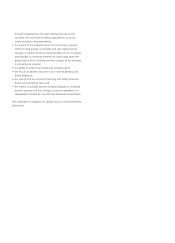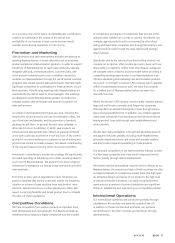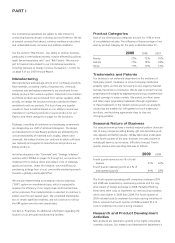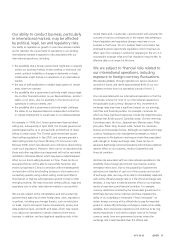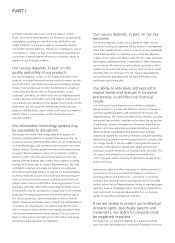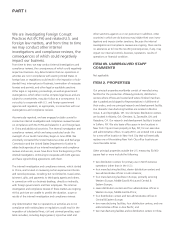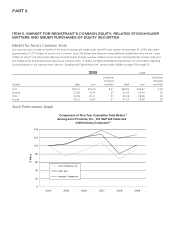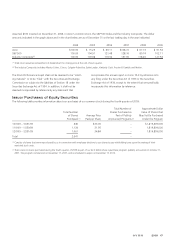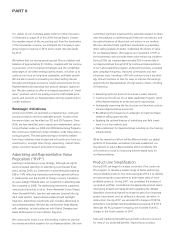Avon 2009 Annual Report Download - page 28
Download and view the complete annual report
Please find page 28 of the 2009 Avon annual report below. You can navigate through the pages in the report by either clicking on the pages listed below, or by using the keyword search tool below to find specific information within the annual report.PART I
Inflation is another risk associated with our international oper-
ations. For example, Venezuela has been recently designated as a
highly inflationary economy. Gains and losses resulting from the
translation of the financial statements of subsidiaries operating
in highly inflationary economies are recorded in earnings. Given
Venezuela’s designation as ahighly inflationary economy and
the devaluation of the official rate, our revenue, operating profit,
and net income will be negatively impacted in 2010 and beyond.
In addition, there can be no assurance that other countries in
which we operate will not also become highly inflationary and
that our operations will not be negatively impacted as aresult.
See the “Segment Review” section within MD&A on page 29 of
our 2009 Annual Report for additional information regarding
Venezuela.
Ageneral economic downturn, arecession
globally or in one or more of our
geographic regions or sudden disruption in
business conditions may adversely affect
our business, including consumer
purchases of discretionary items, such as
beauty and related products.
Adownturn in the economies in which we sell our products,
including any recession in one or more of our geographic regions,
or the current global macro-economic pressures, could adversely
affect our business. Recent global economic events, especially in
North America, including job losses, the tightening of credit
markets and failures of financial institutions and other entities,
have resulted in challenges to our business and aheightened
concern regarding further deterioration globally. If current eco-
nomic conditions continue or worsen, we could experience
potential declines in revenues, profitability and cash flow due to
reduced orders, payment delays, supply chain disruptions or
other factors caused by economic challenges faced by customers,
prospective customers and suppliers. Additionally, if these con-
ditions continue or worsen, any one or all of them could poten-
tially have amaterial adverse effect on our liquidity and capital
resources, including our ability to issue commercial paper, raise
additional capital or the ability of lenders to maintain our credit
lines, and our ability to maintain offshore cash balances, or
otherwise negatively impact our business, results of operations
and financial condition.
Consumer spending is generally affected by anumber of factors,
including general economic conditions, inflation, interest rates,
energy costs, gasoline prices and consumer confidence generally,
all of which are beyond our control. Consumer purchases of
discretionary items tend to decline during recessionary periods,
when disposable income is lower, and may impact sales of our
products. We face continued economic challenges in fiscal 2010
because customers may continue to have less money for discre-
tionary purchases as a result of job losses, foreclosures, bankrupt-
cies, reduced access to credit and sharply falling home prices,
among other things.
In addition, sudden disruptions in business conditions as a result
of a terrorist attack similar to the events of September 11, 2001,
including further attacks, retaliation and the threat of further
attacks or retaliation, war, adverse weather conditions and climate
changes or other natural disasters, such as Hurricane Katrina,
pandemic situations or large scale power outages can have a
short or, sometimes, long-term impact on consumer spending.
We face significant competition.
We face competition from competing products in each of our
lines of business, in both the domestic and international markets.
Worldwide, we compete against products sold to consumers by
other direct-selling and direct-sales companies and through the
Internet, and against products sold through the mass market and
prestige retail channels.
Within the direct-selling channel, we compete on a regional,
and often country-by-country basis, with our direct-selling
competitors. There are also a number of direct-selling companies
that sell product lines similar to ours, some of which also have
worldwide operations and compete with us globally. Unlike most
other beauty companies, we compete within a distinct business
model where providing a compelling earnings opportunity for our
Representatives is as critical as developing and marketing new
and innovative products. Therefore, in contrast to a typical con-
sumer packaged goods (“CPG”) company which operates within
a broad-based consumer pool, we must first compete for a limited
pool of Representatives before we reach the ultimate consumer.
Direct sellers compete for representative or entrepreneurial talent
by providing a more competitive earnings opportunity or “better
deal” than that offered by the competition. Representatives are
attracted to a direct seller by competitive earnings opportunities,
often through what are commonly known as “field incentives”
in the direct-selling industry. Competitors devote substantial
effort to finding out the effectiveness of such incentives so that
they can invest in incentives that are the most cost effective or
produce the better payback. As the largest and oldest beauty
direct seller, Avon’s business model and strategies are often
highly sought after, particularly by smaller local and more nimble
competitors who seek to capitalize on our investment and exper-
ience. As a result, we are subject to significant competition for
the recruitment of Representatives from other direct-selling or
network marketing organizations. It is therefore continually
necessary to innovate and enhance our direct selling and service-




